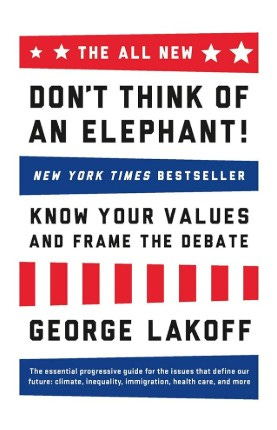Choose words wisely to protect nature
George Lakoff: Phrases create concepts, ‘frames’ for defining debate
Photo of old-growth forest in Oregon by David Herasimtschuk
Stepping into a forest feels like walking into a sanctuary. In Arizona, our mountainside forests come with a layer of soft needles underfoot. The scent of pine wafts through the fresh air. Birds chortle. Creeks gurgle. Shade dapples the ground.
That’s what Nature feels like to many of us—nurturing and healing.
Others step into a forest, look at trees and see board-feet of timber or future furniture. Or they imagine removing the trees to get at gold or copper below.
To them, the environment just offers another means for turning a profit.
If we want to protect mature and old-growth forests from those who see only timber or copper rather than an interconnected landscape that evolved to support life, progressives must learn to pinpoint and “frame” their moral values.
So suggests George Lakoff, a cognitive scientist and linguist who has written at length about how the words we choose to “frame” issues affects whether our brain accepts certain ways of thinking. In 2014, he released a new version of his 2004 book, Don’t Think of an Elephant! Know Your Values and Frame the Debate.
Don’t Think of an Elephant!
Lakoff argued in the book’s 2004 edition that conservatives have worked for decades to “frame” issues in ways that suit their philosophy, and that it’s past time for progressives and liberals to do the same.
Basically, as outlined in this synopsis, he frames the nation as a family, with our two major political parties having different ideas on how to raise the kids—i.e., treat family and others in our society, including nature.
Lakoff compares the conservative mindset to that of a “strict father.” This Father-Knows-Best view starts from the assumption humans are flawed and must be coerced into behaving. There’s a specific hierarchy involved in the conservative view, with white males at the top of a human-centric pyramid.
I would argue this mindset reflects a “survival-of-the-fittest” way of thinking that erroneously interprets the phrase to mean they’re in a battle to the death with others.
Meanwhile, Lakoff views the progressive mindset as being more akin to “nurturant parent(s).” They adhere to the concept that humans are naturally good and can become better with some nurturing.
Empathy is a core value. Diversity offers a means of growth as we learn to share with others. Education ranks high as a way for helping all people become the best versions of themselves.
To me, this reflects a more cooperative mode, one that recognizes how helping each other out can actually improve everyone’s chances of survival.
Conservatives are decades ahead of progressives in devising the vocabulary to frame concepts in their favor. Tax cuts for the rich transform into “tax relief.” Earned income from decades of paying into Social Security becomes “entitlement programs,” with “unearned” implied.
And, in a recent twist codified in a March 1 executive order, clearcutting forests for timber increases our “self-reliance” and “economic security.” No mention is made of how their loss will impact forests’ ability to contribute to local and global cooling as temperature’s ramp up.
The cover of Lakoff’s book.
Applying framing to Nature
Many progressive concepts require paragraphs rather than slogans to explain. But Lakoff explains snappier slogans won’t solve the problem without building suitable frameworks in our brains for supporting the concepts.
Lakoff’s 2004 Don’t Think of an Elephant! rarely ventures into the environmental sphere, beyond listing it among the six camps that share progressive values. But he followed up on this with a 2010 Environmental Communication article:
Let us begin with the very concept of the ‘‘environment.’’ The Environment Frame sees the environment as separate from, and around, us. Yet, we are not separate from Nature. We are an inseparable part of Nature. Yet we separate self from other, and conceptualize Nature as other. This separation is so deep in our conceptual system that we cannot simply wipe it from our brains. It is a terribly false frame that will not go away.
Unfortunately, the conservative efforts at framing the debate in our modern society have succeeded so well that it’s an uphill battle for progressives.
As Lakoff continued in his Environmental Communication article (italics his):
Here’s a deep truth that is also hard to discuss because there is no established frame for it in public discourse. The economic and ecological meltdowns have the same cause, namely, the unregulated free market with the idea that greed is good and that the natural world is a resource for short-term private enrichment. The result has been deadly: toxic assets and a toxic atmosphere.
That is, the joint cause is short-term greed together with the fact that the global economy and ecology are both systems. … We have to think in global, systems terms and we don’t do so naturally.
The progressive challenges in framing the environmental debate contribute to why I suggested on Friday that we should consider following the lead of Indigenous thinkers, especially when it comes to thinking in terms of protecting and restoring “Mother Earth.”

‘Mother Earth’ v. ‘Gaia’
“Mother Earth” conveys a powerful concept in two words. This framing reminds us we are born from the planet, not separate from it. It suggests we should care for it as we would our own mothers. It implies that our shared planet gives birth to every life form, supporting the concept of interrelatedness.
Non-Indigenous people have used the phrases “Deep Ecology” and “permaculture” in an attempt to activate similar constructs. But, in my experience, those phrases haven’t caught on enough to be used in general conversation without explanation.
Similarly, I tried to invoke a planet-respecting framework using the western science concept of Gaia theory, which views the Earth as a living system.
In a 2010 book, I considered how our planet, Gaia, had survived hot climates of the prehistoric past. Punchline: During times warmer than today, global forests and wetlands expanded. That implied these systems help the planet survive and thrive in warmer climates, and I shared reasoning from modern-day observations about why that’s true.
Much to my chagrin, I found framing the Earth as a living system dubbed Gaia seemed to appeal only to a small percentage of the population. Despite the popularity of Lovelock’s 1979 book, Gaia: A New Look at Life on Earth—still in print today—using the framework of “Gaia” continues to require a lengthy explanation.
The phrase “Mother Earth,” in contrast, seems to activate an existing framework in our brains. It doesn’t always generate a positive response—in general, academics balked when I pulled in the concept of Mother Earth to help explain Gaia theory—but it’s there.
Anyway, that’s just one idea. Lakoff’s popular Don’t Think of an Elephant! might spark healthy debate about how to frame the protection of land and water.
The latter phrase, incidentally, is another way Indigenous peoples like to describe what those of us in the mainstream might call “environmental activism.” Those involved in the Standing Rock efforts made it clear that they were not protesting, but protecting.
It’s a brilliant way to avoid the trap of reacting to rather than defining frames.
They use phrases such as “water is life,” capturing the concept that humans are at least half water and so purity of water is important for human health, and “sacred land,” acknowledging that land can have its own essence worthy of protection from exploitation.
The frameworks developed by Indigenous peoples could go far in helping progressives who fall into the environmental camp refine our efforts to develop frames that resonate.
So, I sure hope some of them are invited to sit at the tables if Lakoff’s ideas continue to be considered for modern-day applications.
After all, they’ve succeeded in maintaining their nature-respecting worldview for many centuries now despite the dominant culture’s promotion of greed and exploitation.
What’s more, for millennia before that, their way of thinking kept the land now occupied by the United States full of forests, flowing streams and abundant wildlife.
Clearly their worldview had a powerful effect.
If we could invoke a modernized version of it to help define the progressive framework, perhaps we could keep, well into the future, more of our existing old-growth forests.
We need these sanctuaries more than ever for our own well-being and that of our planet—Mother Earth.
This 5-minute video of George Lakoff describes ‘frames.’
Here’s a 58-minute video of a lecture that lays out some of his ideas as they apply in the political sphere.
CORRECTION FROM AUTHOR: The original version of this post indicated Don’t Think of an Elephant! was re-published in 2025. The updated book was released in 2014. A website by Together Press erroneously listed the publication date as April 20, 2025.






In coming days, I'll be asking some of my Indigenous friends what they think about sharing the concept of "Mother Earth." My impression is they wish we'd open our eyes to this way of thinking, but if they're okay with it, I'll share what I find out. Or please, post a comment here!
As usual, I welcome anyone's feedback and insights on the topic at hand and 'framing' in general. We've got to do something to make our message more resonant!